
23 Oct positive thinking
My father believed in the power of positive thinking. He always saw the glass as “half-full”, rather than “half-empty” and never dwelt on setbacks or disappointments. He had experienced some of those in his lifetime. His own father died when he was a teenager, and as the eldest of three boys he went out to work to help support his mother. He never went to college, but he learned to fly and during the war served as a bomber pilot in the RAF. During a stint in the hospital, his own crew perished with another pilot after being shot down. Later my father had a successful career as an airline executive. (As an aside, he once took me to the McDonnell Douglas factory in Long Beach, California, where we walked through the shell of a DC10.)
Like many of his generation, he didn’t talk much about his feelings. I don’t know how he felt about the tragedies he suffered, but I can imagine they would have shaped his own world view. Yet he kept a positive attitude to life and lived to the age of 96. When he was telling me about the power of positive thinking all those years ago, he was probably attempting to correct some negative tendencies in my own personality.
What is positive thinking? Basically, it’s the idea that the way you think helps determine your outcomes in life. At some point in his life my father had probably read the book by the reformed pastor Norman Vincent Peale, called “The Power of Positive Thinking”, which became a best seller after it was published in 1952. The first chapter of the book is entitled “Believe in Yourself”, which gives an idea of what follows. The book was very influential, and its message continues to permeate our culture today.
A few years ago I bought a second hand copy and I discovered why the book had proven so popular. It is a practical manual of self-improvement with a Christian thread running through it. Peale explained that the way you use your mind can make a real difference to your outlook and, consequently, to your overall health and well-being.
He recommended mind training exercises, such as making positive affirmations: e.g. saying over and over again: “I can do all things through Christ which strengtheneth me.” (Philippians 4:13). This technique was later embraced by another advocate of mind power, Louise Hay, whose 1984 book “You Can Heal Your Life” was about making change happen through the use of repeated affirmations.
The benefit of using positive affirmations is that it counters the often negative narrative we learned to adopt when we were younger. For many people their harshest critic is themselves, and positive thinking can challenge a prevailing narrative of “I’m not good enough” or “I don’t deserve this” to one of possibility and change.
Peale also drew upon techniques common to eastern religions. He advocated the practice of emptying the mind of all negative thoughts, especially “fears, hates, insecurities, regrets and guilt feelings.” He went further and said to keep in mind that “God is with you and nothing can defeat you. Believe that you now receive power from him.”
The book has its strengths and weaknesses. Using the power of the mind to change your approach to life really does work. Practiced regularly, it can produce real change and can move people from an attitude of “everyone else is to blame” to one of “I have power to change my life for the better.” Its weakness, at least from a Christian point of view, is its anthropocentric focus – it places the individual at the center of the universe, rather than God. The theologian Reinhold Niebuhr said that Peale’s message was “a partial picture of Christianity, a sort of half-truth”.
However, there’s a great deal we can take from the book, particularly in the current negatively-charged political climate. As I read the blogs on the internet this week, I am noticing a general deterioration in the tone of the “debate”, as abuse replaces argument and both sides become more and more entrenched. The competing views of what is really happening suggests that we appear to be one nation living in two different worlds. Or perhaps it simply reflects the way our locked-down, frustrated and angry nation is having a nervous breakdown.
All this negativity can have a damaging impact on the national soul, and there is no easy answer to the problems which beset us. Perhaps that is why a dose of positive thinking may be the thing we need right now.
With the blessings of peace
Father David




No Comments